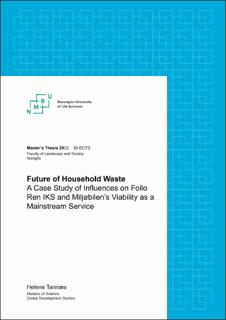| dc.description.abstract | Massive amounts of waste are generated globally, requiring improved sorting and collection methods to reduce waste and increase recycling and reuse. Global efforts are being initiated to address this increasing waste and its subsequent consequences. Norway is a country that contributes to these efforts and has implemented strong national policies to handle its own waste. In Norway, each municipality is responsible for managing household waste, with most of them coming together to establish an intercommunal company (IKS) to manage this work. This study focuses on the implementation of a waste collection service called Miljøbilen by Follo Ren, a waste management company responsible for waste management in Frogn, Nesodden, Nordre Follo and Ås. The aim of Miljøbilen is to reduce the number of visitors to the recycling centres, decreasing emissions from cars, and provide a beneficial service for individuals who cannot access these centres due not owning a car, have limited waste to dispose of, or have reduced physical capabilities. The research conducted an EGS (Environmental Governance Systems) Framework analysis. This analysis identified key factors influencing the implementation of a waste collection service, including the company and its policies, the services provided to households, and the potential outcomes in terms of financial, environmental, and social results. A discussion on the advantages and disadvantages of Miljøbilen revealed that while there are financial costs associated with running the service, the overall financial, environmental, and social benefits make it socio-economically profitable. A survey was conducted as part of the evaluation of Miljøbilen, indicating that users of the service are generally satisfied. For non-users, the survey responses suggest that providing more information about the service can potentially increase its usage. The implementation of Miljøbilen supports the need for individually tailored and streamlined waste management services due to an increasing focus on reducing household car usage. Miljøbilen offers one perspective on the effectiveness of such services. | |
